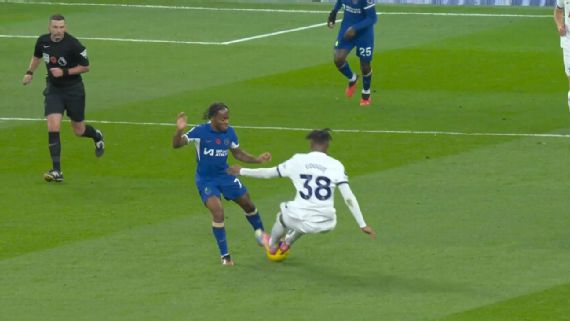In the Premier League, the Video Assistant Referee (VAR) system has become a contentious topic that sparks weekly discussions and debates. This essay looks at the decision-making process and evaluates how accurate the choices were.

The Main Event: Chelsea vs. Tottenham with VAR in Spotlight
Minute 14: Son’s Banned Goal
Son Heung-Min’s goal was disallowed for offside in a closely contested encounter.
The Video Assistant Referee review supported this conclusion.
Eighteen Minutes: Udogie’s Impending Red Card Disaster Although Udogie’s challenge on Raheem Sterling caused some controversy, Video Assistant Referee decided that a yellow card was adequate.
21st Minute: The Handball Incident with Sterling
A handball occurred during the buildup, and a Video Assistant Referee check resulted in Raheem Sterling’s goal being disallowed.

Romero’s alleged red card in the 21st minute
A Video Assistant Referee review was conducted following Cristian Romero’s kickout at Levi Colwill, but no red card was issued.
28th Minute: Offside Goal by Caicedo
Video Assistant Referee confirmed that Moisés Caicedo’s goal was disallowed for a slight offside call.
Romero’s tackle on Fernández in the 28th minute
Romero might face a red card following his challenge on Enzo Fernández, which led to Cole Palmer’s Video Assistant Referee-awarded penalty.
37th Minute: Offside Goal by Jackson
Video Assistant Referee verified that Nicolas Jackson’s goal was disallowed for offside.
Porro’s Challenge on Sterling in 45+7 Minutes
Following a Video Assistant Referee review, Sterling’s penalty appeal was turned down, and the ruling was upheld.
45+11 Minutes: James’s Udogie Challenge
The Chelsea captain was lucky that Video Assistant Referee wasn’t called on James’ challenge on Udogie at the conclusion of the first half.
54th Minute: Udogie’s Red Card
Tottenham was down to ten men when Destiny Udogie was given another yellow card.
75th Minute: The Goal Is Still Standing
After a Video Assistant Referee investigation, Sterling’s assist for Jackson’s score was upheld despite a near offside call.
Minute 78: Dier’s Inadvertent Goal
The goal by Eric Dier was disallowed for offside, maintaining Chelsea’s lead.
After-Match Analysis
The story of Tottenham vs. Chelsea was dominated by Video Assistant Referee interventions, red cards, and goals that were disallowed. It was a rollercoaster of emotions. In a truly chaotic game, Cole Palmer and Nicolas Jackson were crucial to Chelsea’s victory.
Player Ratings
Tottenham Hotspur
- Guglielmo Vicario: 10
- Pedro Porro: 7
- Cristian Romero: 3
- Micky van de Ven: 6
- Destiny Udogie: 3
- Yves Bissouma: 8
- Pape Matar Sarr: 7
- Dejan Kulusevski: 8
- James Maddison: 6
- Brennan Johnson: 6
- Heung-min Son: 7
Chelsea
- Robert Sanchez: 6
- Reece James: 5
- Thiago Silva: 5
- Axel Disasi: 5
- Levi Colwill: 5
- Enzo Fernandez: 7
- Moises Caicedo: 8
- Conor Gallagher: 8
- Cole Palmer: 8
- Nicolas Jackson: 8
- Raheem Sterling: 9
Conclusion
The Video Assistant Referee system continues to be a point of contention in the Premier League, influencing game outcomes and sparking intense debates. The Tottenham vs. Chelsea match showcased its impact, leaving fans and pundits alike discussing the decisions made.
Alabama Chiefs: A Resurgent Tide
1. What is the role of VAR in football?
· The Video Assistant Referee (VAR) is a system used in football to review and potentially change decisions made by the referee during a match. It provides additional assistance in situations that may be too close or difficult for the on-field officials to judge accurately.
1. How does Video Assistant Referee review offside decisions?
· Video Assistant Referee checks offside decisions by using technology to analyze the position of players at the moment the ball is played. If a player is deemed to be offside, the goal or scoring opportunity is disallowed.
1. Can Video Assistant Referee intervene in all situations?
· Video Assistant Referee can intervene in certain situations, including goals, penalty decisions, direct red card incidents, and cases of mistaken identity. However, there are limitations to when Video Assistant Referee can be used, and some decisions remain solely at the discretion of the on-field officials.
1. What criteria does Video Assistant Referee use to determine handball offenses?
· Video Assistant Referee looks at factors such as the position of the arm, the movement of the player, and whether there was intent or a natural position. If a player handles the ball in a way that violates the rules, VAR may recommend a review and a potential decision change.
1. How do referees communicate with Video Assistant Referee officials during a match?
· Referees communicate with Video Assistant Referee officials through a headset and microphone system. They can request reviews or receive information from the Video Assistant Referee team to help make more accurate decisions.
